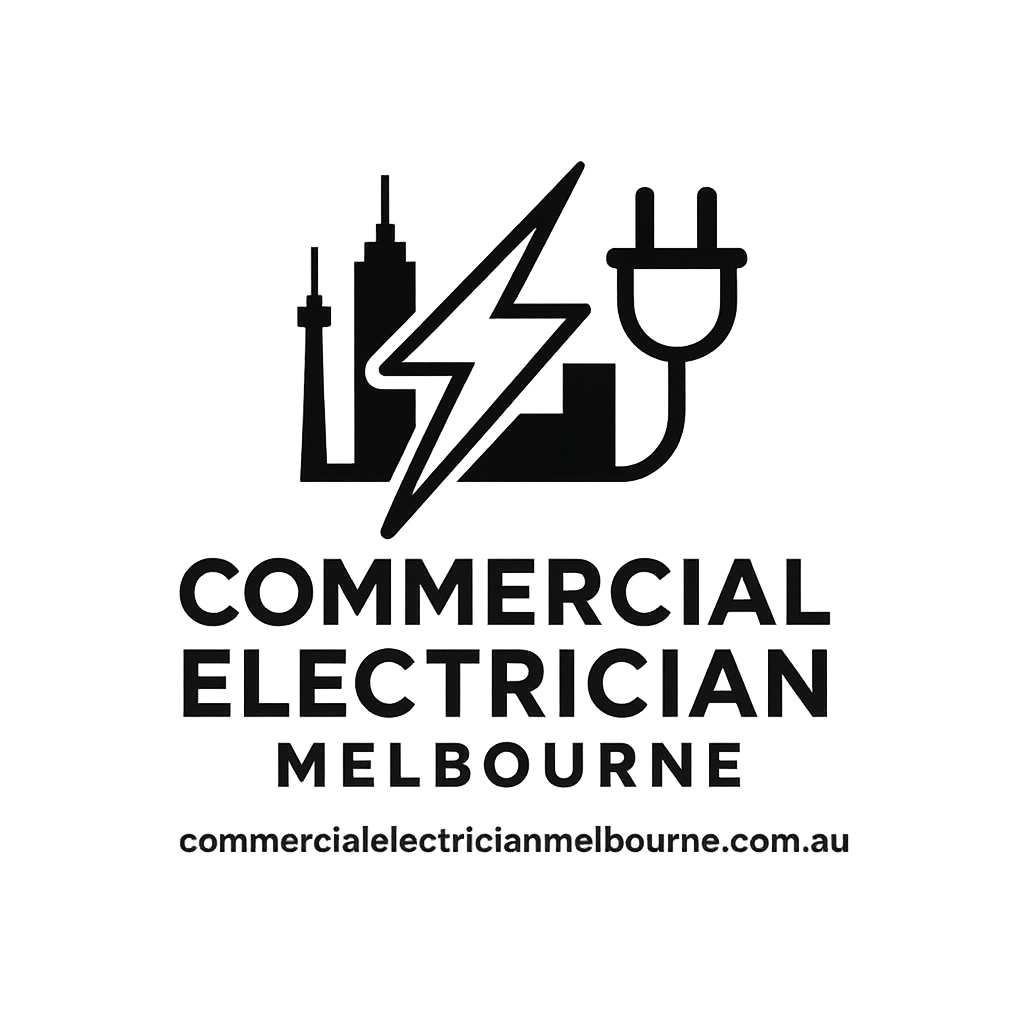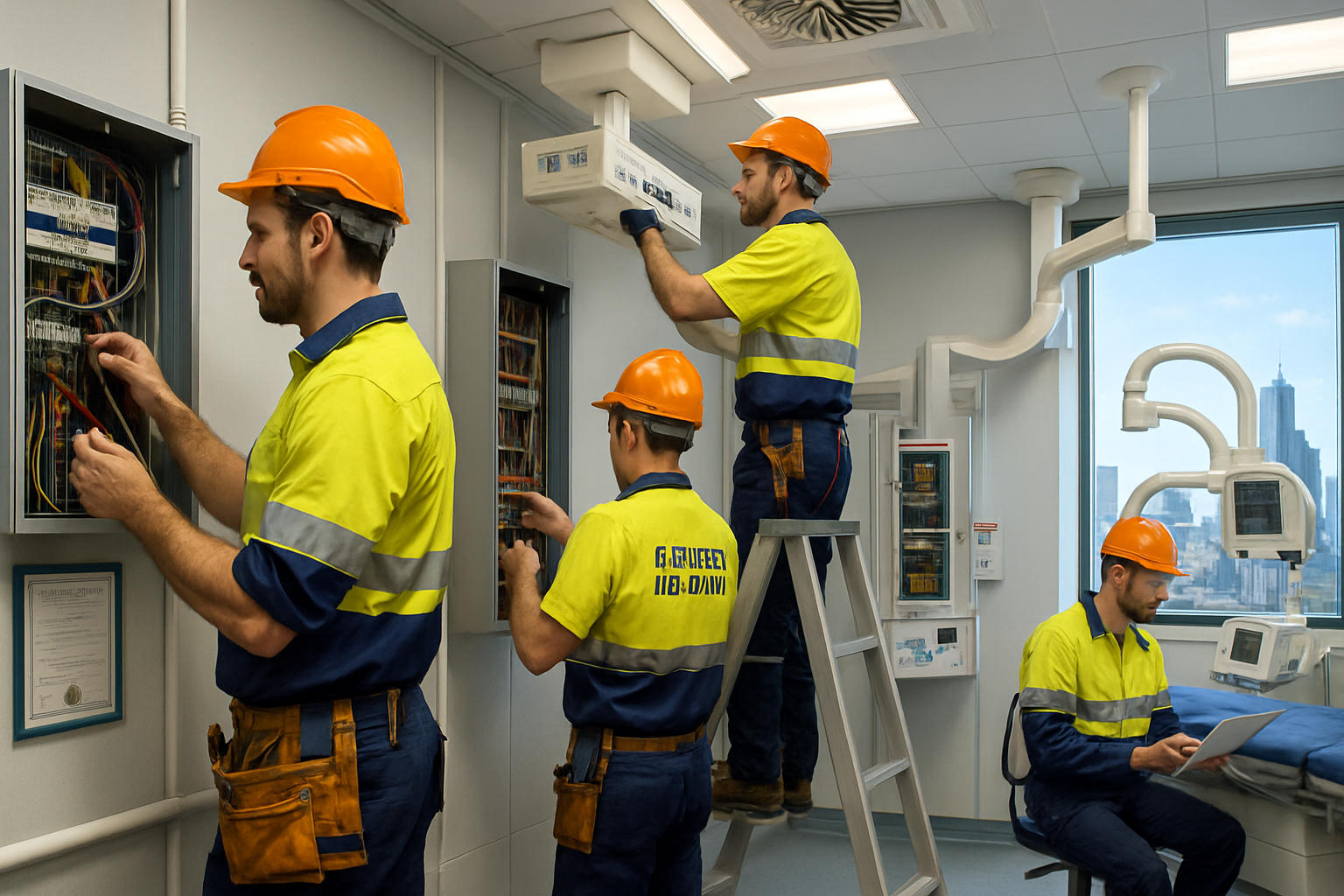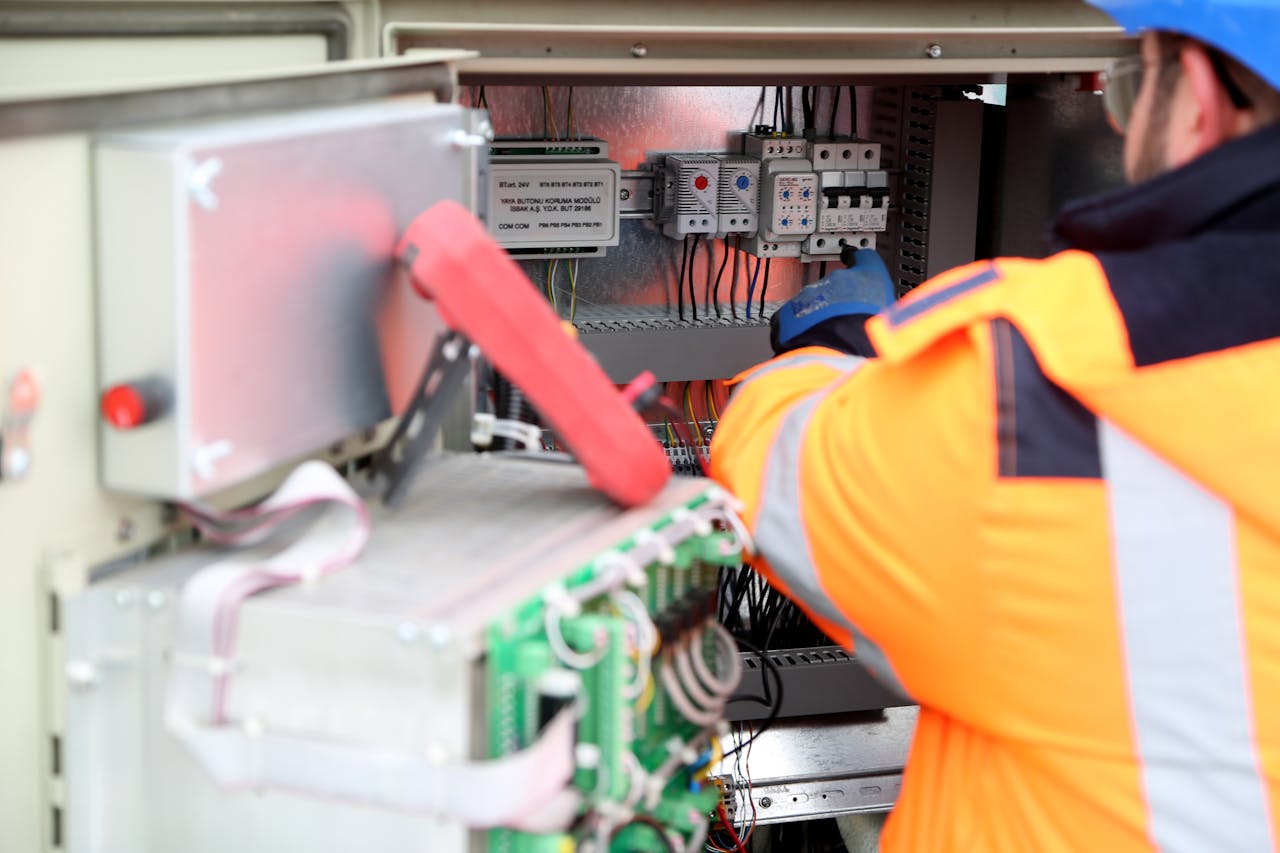Medical Center Electrical Installation Melbourne: Healthcare Compliance
When you run a medical facility, whether it’s a bustling hospital, a specialist clinic, or a modern doctor’s office, one thing is abundantly clear: electrical systems aren’t just about power – they’re about saving lives. Reliable medical-grade electrical systems ensure that critical patient care areas remain safe and operational at all times. In Melbourne, where regulatory standards are as unique as our coffee spots, getting it right is not just a smart business decision—it’s a legal and ethical necessity.
In this blog post, we’ll break down everything you need to know about medical electrical installation in Melbourne. We’re talking about everything from healthcare electrical wiring intricacies to local electrical codes, and from finding the best Melbourne hospital electricians to practical tips for preparing your facility for a major electrical upgrade. Grab your coffee, sit back, and let’s dive into the world of healthcare compliance electrical systems in Melbourne.
Table of Contents
- Why Medical Electrical Installation is Crucial for Your Facility
- Understanding Medical Electrical Wiring and Systems
- Features and Benefits of Medical-Grade Electrical Systems
- Local Regulations, Codes, and Compliance Requirements
- Finding the Right Commercial Electrician in Melbourne
- Practical Tips for Preparing Your Facility for Electrical Work
- Real-Life Scenarios and Solutions
- Frequently Asked Questions
- Conclusion
Why Medical Electrical Installation is Crucial for Your Facility
Running a healthcare facility is a balancing act between patient care, operational efficiency, and stringent compliance standards. Unlike other electrical installations, medical facility power systems require special attention. Here’s why:
- Patient Safety: Reliable electrical systems mean life-saving equipment such as ventilators, diagnostic machines, and emergency systems are always powered.
- Compliance: In Melbourne, healthcare facilities must comply with local and national electrical safety standards. These include healthcare electrical compliance standards and hospital electrical code compliance regulations.
- Operational Efficiency: Downtime due to electrical faults can jeopardise both patient care and operational continuity. A robust system minimizes these risks.
- Insurance and Liability: Meeting electrical infrastructural requirements can significantly reduce your insurance premiums and minimize potential liability in the event of an incident.
A properly designed and maintained medical electrical installation doesn’t just power your equipment—it powers the very backbone of your practice, ensuring that patient care is never compromised.
Understanding Medical Electrical Wiring and Systems
What is Medical Electrical Wiring?
Medical electrical wiring goes beyond the typical installation found in commercial buildings. It involves specialized, medical-grade wiring and electrical components that are engineered to meet the specific demands of healthcare facilities. This includes:
- Isolation Panels: These panels provide reliable separation between standard electrical circuits and those powering critical medical equipment.
- Redundant Power Systems: Medical facilities often feature backup power systems such as hospital backup power systems and medical center generator installations to ensure continuous operation during power outages.
- Surge Protection and Safety: With sensitive equipment and critical care areas on the line, effective surge protection and electrical fault protection in healthcare are a must.
- High-Quality Outlets: Melbourne medical grade outlets are specifically designed to handle higher loads and constant use without compromising safety.
Unique Aspects of Healthcare Electrical Services
Medical electrical installations feature systems designed for continuity and safety in critical environments:
- Dedicated Circuits: Healthcare facilities often have dedicated circuits for high-demand equipment like MRI machines, CT scanners, and surgical lighting.
- Emergency Power and UPS Installations: Uninterruptible Power Supply (UPS) installations make sure that when the power goes out, critical systems remain online until a backup generator kicks in.
- Medical Imaging Room Electrical Installations: Rooms dedicated to diagnostic imaging require very specific electrical setups to reduce interference and ensure power stability.
- Tailored Fit-Outs: Whether it’s a doctor’s office electrical wiring upgrade or a comprehensive redesign of a major hospital’s electrical infrastructure, tailored fit-outs ensure every corner of your facility meets the necessary standards.
For business owners in Melbourne, understanding these elements helps demystify why investing in professional electricians, especially those experienced with healthcare facilities, is so important.
Features and Benefits of Medical-Grade Electrical Systems
Features That Stand Out
- Robust Design: Medical electrical systems are designed to handle high loads and emergencies, ensuring that nothing disrupts patient care.
- Compliance-Focused: All installations meet strict healthcare compliance electrical standards, reducing legal risks.
- High Reliability: With fail-safes such as isolation panels, emergency power, and UPS systems, these installations provide reliability even during system failures.
- Advanced Safety Mechanisms: Built-in surge protection, fault detection, and proper grounding all combine to minimize the risk of electrical hazards.
- State-of-the-Art Technology: Modern medical facilities require cutting-edge technology, from smart panels to digital monitoring systems.
Benefits to Your Business
- Enhanced Patient Safety: With specialized electrical installations, you reduce the risks associated with equipment failure, ultimately safeguarding patients.
- Regulatory Compliance: Meeting the Australian and Victorian standards for electrical systems in healthcare settings ensures that your facility remains compliant and avoids fines or legal complications.
- Operational Continuity: Redundancy and backup systems mean that even during power disruptions, your facility remains fully operational.
- Cost Efficiency in the Long Run: While the initial installation cost might be higher, medical-grade systems reduce maintenance costs and prevent costly downtime.
- Reputation Boost: A facility known for its state-of-the-art electrical installations stands as a safe and reliable choice for patients and partners alike.
These features and benefits create a secure, compliant, and efficient working environment—ultimately translating into a smoother operation and a better overall experience for both staff and patients.
Local Regulations, Codes, and Compliance Requirements
Key Regulations in Melbourne and Australia
Melbourne-based healthcare facilities must adhere to a host of local and national regulations. Understanding these is essential for both operational safety and compliance:
- Australian Standards for Electrical Installations: These guidelines ensure that all electrical systems, especially those in critical care areas, follow best practices in installation and maintenance.
- Healthcare Electrical Compliance Standards: Special regulatory requirements exist for installations in patient care areas, diagnostic rooms, and surgical suites. These cover everything from emergency power systems to medical imaging room electrical setups.
- Hospital Electrical Code Compliance: Melbourne hospital electricians must be familiar with these codes to ensure that installations meet all the necessary safety and operational criteria.
- Local Council Regulations: Depending on your facility’s location in Melbourne, local council regulations may further dictate installation practices.
- Regular Audits and Certifications: Compliance isn’t a one-off event. Regular electrical testing for healthcare facilities is mandatory to ensure ongoing safety and efficiency. Documentation is often required for every inspection, validating that your setup meets current Australian electrical codes.
Best Practices for Staying Compliant
- Stay Informed: Regulations can change. Ensure that your electrical installation partner is always up-to-date on the latest standards, such as emerging requirements for healthcare electrical safety and installation.
- Regular Maintenance and Testing: Schedule frequent check-ups and maintenance checks for evidence of any wear and tear. Routine electrical panel upgrades and testing of emergency power systems can help avoid unexpected outages.
- Comprehensive Documentation: Maintain thorough records of all installations, modifications, and maintenance works. This documentation can be critical during audits or inspections.
- Engage Experienced Professionals: It’s not enough to use any electrician. You need a Melbourne healthcare electrical contractor who specialises in medical-grade installations. Their hands-on experience ensures that your facility meets all safety and compliance standards.
These best practices ensure that your facility isn’t just capable of handling emergencies—it’s also prepared to adapt to future changes in regulatory requirements and technology.
Finding the Right Commercial Electrician in Melbourne
Finding an electrician who specialises in medical electrical installations can be a challenge, but it’s crucial for ensuring that your facility meets all compliance and operational standards. Here are some practical tips for finding the right professional:
Recommendations and Reviews
- Word of Mouth: Ask other local medical facilities for recommendations. Peer-to-peer advice often leads to a shortlist of qualified Melbourne medical center electricians.
- Online Reviews: Websites like Google Reviews and industry networks provide feedback on service quality, reliability, and compliance with healthcare electrical installation standards.
- Professional Associations: Look for electricians who are members of recognised industry associations. These memberships often indicate a commitment to ongoing training and adherence to the latest codes.
Questions to Ask Potential Contractors
- Experience with Healthcare Installations: Ask how many healthcare electrical services projects they have completed in Melbourne and whether they have specific experience in medical facility electrical maintenance.
- Knowledge of Local Codes: Ensure they are well-versed in local council regulations, Australian Standards for Electrical Installations, and hospital backup power systems.
- Response Time for Emergencies: In the healthcare industry, timing is critical. Find out how quickly they can respond to electrical emergencies.
- Insurance and Certifications: Verify that they hold the necessary certifications and insurance coverage, especially for high-risk jobs like medical center electrical upgrades.
- Service Guarantees: Understand what guarantees they offer for their work. Reliable contractors should provide warranties on both the products used and their workmanship.
Vetting and Contracting
- Get Multiple Quotes: Don’t settle for the first quotation. Request detailed quotes from several suppliers to get an idea of competitive pricing and the quality of proposed solutions.
- Check Prior Work: Ask to see examples of previous medical electrical wiring projects or request references.
- Detailed Contracts: Make sure that your contract explicitly outlines the scope of work, timelines, and compliance references (such as adherence to healthcare building electrical codes).
By following these guidelines, you ensure that your facility is in the hands of experts who understand both the technical and regulatory aspects of healthcare electrical installations in Melbourne.
Practical Tips for Preparing Your Facility for Electrical Work
Preparing your facility for major electrical installation can seem overwhelming. However, a little planning before the work begins can make a world of difference. Here are some actionable tips that can help streamline the process:
Pre-Installation Checklist
- Assessment of Current Systems: Conduct a comprehensive audit of your existing electrical infrastructure. Identify areas that need upgrading, such as outdated medical equipment power installations or non-compliant wiring systems.
- Plan for Minimal Disruption: Schedule the electrical work during off-peak hours to ensure minimal interruption to patient care and daily operations. If possible, plan temporarily for areas that require power shutdowns.
- Clear Communication Channels: Inform staff and stakeholders about the scheduled work, expected downtime, and safety precautions. Clear communication helps avoid confusion and keeps everyone prepared.
- Safety Measures and Contingency Plans: Develop a plan that includes on-site safety protocols. Ensure that backup systems like emergency generators or UPS installations are tested and readily available during the installation.
- Secure Documentation: Keep a record of all permits, compliance certificates, and prior maintenance reports. These documents will prove invaluable during audits and future upgrades.
During Installation
- Supervision and Regular Updates: Appoint a facility manager or a designated point of contact who liaises with the electrician team. Request daily progress updates to ensure that the work adheres to the agreed timeline and scope.
- Minimize Areas of Impact: If possible, isolate the work to a specific section of your facility, reducing overall disruption. This approach helps maintain continuity in patient care, particularly in critical care areas.
- On-Site Testing and Inspections: After each phase of the installation, have a qualified inspector test the system. This ensures that each component—from medical imaging room electrical setups to doctor’s office electrical fit-out—meets the required standards before moving on to the next phase.
Post-Installation
- Comprehensive Testing: Once the installation is complete, conduct a full-scale test of the electrical infrastructure. This includes checking backup power systems, surge protectors, and medical center UPS installations.
- Staff Training: Ensure that your facility’s maintenance team receives a detailed briefing on the new system. In some cases, training on emergency protocols related to the new installation may be required.
- Document and Review: Once everything is set, update your facility’s maintenance documentation. Keep a record of the installation details, warranties provided, and any recommendations for future upgrades.
By planning thoroughly, you not only ensure a smoother installation process but also lay the groundwork for a reliable and compliant electrical system in your healthcare facility.
Real-Life Scenarios and Solutions
To better understand the importance of proper medical electrical installation, let’s explore a couple of real-life scenarios where robust electrical systems made all the difference:
Scenario 1: Emergency Backup Systems in a Busy Hospital
A large Melbourne hospital recently underwent a significant upgrade of its electrical infrastructure. The goal was to ensure that patient care areas, including intensive care units and surgical rooms, had uninterrupted power supply—even in the case of a complete citywide outage.
- Challenge: The existing infrastructure was outdated, and previous incidents of power fluctuations had raised concerns among staff and administrators.
- Solution: The facility hired a specialist Melbourne hospital electrician who installed:
- A state-of-the-art hospital backup power system,
- Redundant circuits for critical care areas,
- A comprehensive UPS installation for vital equipment.
- Outcome: During a subsequent power failure, the hospital’s emergency generator and medical center UPS installation kicked in seamlessly, ensuring that life-saving equipment remained operational. The electrical testing for healthcare confirmed that all installations met strict compliance standards, leading to praise from both management and healthcare regulators.
Scenario 2: Upgrading Electrical Systems in a Specialized Medical Clinic
A private medical clinic in Melbourne needed an upgrade in its electrical wiring to support advanced diagnostic machines and a new imaging room. Their doctor’s office electrical wiring had to not only power sensitive equipment but also ensure patient safety.
- Challenge: The original installation did not provide adequate surge protection or meet the modern requirements for a medical facility. The medical imaging room electrical installation was especially problematic due to its high sensitivity.
- Solution: The clinic engaged a commercial electrician with experience in healthcare facility electrical installation. The electrician:
- Upgraded the medical grade electrical systems to ensure compatibility with new diagnostic equipment,
- Installed isolation panels and surge protection devices,
- Provided detailed documentation of the new healthcare electrical compliance standards met.
- Outcome: Post-installation, the clinic not only improved patient safety but also experienced fewer equipment malfunctions. The upgraded system met all local electrical codes, ensuring the clinic was future-proofed against regulatory changes while also boosting patient confidence in the facility.
These scenarios underscore how crucial it is to work with professionals who understand the delicate balance between robust technical performance and strict regulatory compliance.
Frequently Asked Questions
Q: What makes medical electrical installation different from standard electrical work?
A: Medical electrical installations require specialised equipment and components such as isolation panels, backup power systems, and dedicated circuits designed to handle life-critical operations. They are built to comply with strict healthcare compliance electrical standards.
Q: Why is compliance so important in medical facilities?
A: Compliance ensures that your facility meets stringent safety standards, minimising the risk of electrical hazards and ensuring that critical equipment remains operational. It also protects you from potential legal issues and insurance complications.
Q: How often should my facility’s electrical systems be inspected?
A: Regular inspections are recommended—often on an annual basis. However, high-use facilities, especially those with sensitive medical equipment, should consider more frequent electrical testing for healthcare to catch potential issues early.
Q: What is a UPS installation and why is it essential?
A: A UPS (Uninterruptible Power Supply) installation provides backup power in the event of an outage, ensuring that critical systems remain operational until a secondary power source, like a generator, takes over. This is crucial in maintaining continuous care during power disruptions.
Q: How can I be sure that the electrician I hire is qualified for a healthcare facility?
A: Look for electricians with specific experience in healthcare electrical services, check their certifications and memberships with industry associations, and ask for references from previous healthcare-based projects.
Conclusion
When it comes to medical electrical installation in Melbourne, there’s no room for compromise. A reliable and well-maintained electrical system isn’t just a technical upgrade—it’s a cornerstone of patient safety, healthcare compliance, and operational efficiency. For small business owners and facility managers, working with a specialist Melbourne medical center electrician means peace of mind, knowing that every circuit, outlet, and backup system is designed to meet the highest standards in patient care and regulatory compliance.
From understanding the nuances of medical electrical wiring to navigating local regulations and choosing the right contractor, every step of the process is essential. By following best practices, staying up-to-date with local codes, and ensuring regular maintenance and testing, you protect not just your investment, but also the people who depend on your facility every day.
In a world where a momentary power lapse can have serious consequences, ensuring that your healthcare facility’s electrical systems are robust and compliant isn’t just a technical necessity—it’s a business imperative. So, take the time to partner with experienced professionals, embrace comprehensive planning, and make sure that your electrical systems are as meticulous and reliable as your commitment to patient care.
Thank you for joining us on this deep dive into medical electrical installation in Melbourne. If you have any further questions or need recommendations for experienced Melbourne hospital electricians, feel free to reach out or leave a comment below. Here’s to powering safe, compliant, and efficient healthcare for all of Melbourne’s medical facilities!
By ensuring that your facility’s heart—its electrical system—is strong and well-protected, you’re not only meeting regulatory demands but also providing a secure, reliable environment for patient care. Remember, a well-executed electrical fit-out today paves the way for a resilient, future-proof healthcare facility tomorrow.
Stay safe, stay compliant, and let your power be the lifeline that keeps your healthcare facility running, no matter the circumstances.





0 Comments